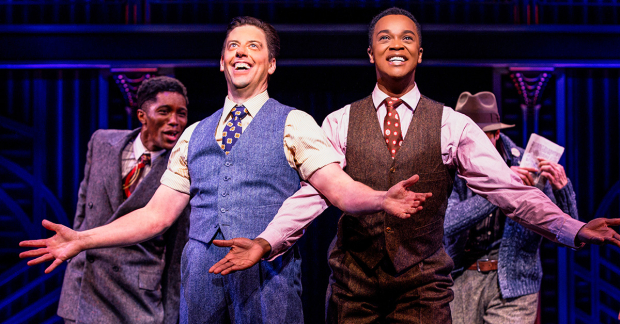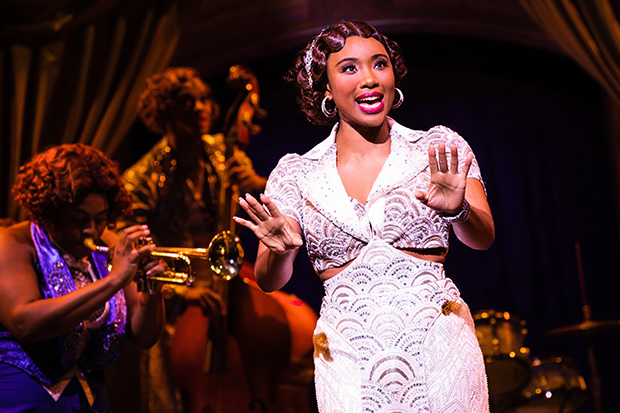Marc Shaiman, Scott Wittman, Amber Ruffin, and Matthew López Like It Hot on Broadway
The creators of the new musical ”Some Like It Hot” tell us about their creative process.
There's always a lot of pressure when creating a new musical, and even more so when it's based on a beloved property, and that property already exists as a musical. Such was the challenge faced by Tony-winning songwriters Marc Shaiman and Scott Wittman, Tony-winning playwright Matthew López, and Emmy-nominated writer and comedian Amber Ruffin as they sought to bring the film Some Like It Hot to the stage of the Shubert Theatre. Here, this hilarious quartet tells us what it took.

(© Marc J. Franklin)
These conversations have been condensed and edited for clarity.
How did you all come to be part of this project?
Matthew López: I was summoned to the Shubert offices, and I thought they caught me sticking my gum under the seat at some show and they were going to ban me from seeing Broadway shows forever. Instead, I met with [producers] Neil Meron and Craig Zadan and they were like, "How would you like to write a musical?" That was seven years ago now.
Marc Shaiman: We had just finished working with them on Smash, and we came to mind, as we had been writing songs for Marilyn Monroe. In one instance, the song "Let's Be Bad" on Smash was actually in the multiverse version of Some Like It Hot. It made sense to ask us, but we had had our share of working on iconic properties at that time.
Scott Wittman: We had just done Charlie and the Chocolate Factory and Mary Poppins Returns. But then they bandied about Matthew López and Casey Nicholaw, and that made it interesting. I had been a fan of Matthew's play The Legend of Georgia McBride, so as soon as he was on board, it became a new universe to explore with him, and that was thrilling.
Amber Ruffin: I started three years ago. When I found out that all the heaviest hitters were writing a show together and they asked if I wanted to be part of it, I was like, "Absolutely. Everyone does." I've written a couple of musicals, but they're more like hourlong comedy goof-abouts. This is the first real musical I've written with people who can, like, sing and dance, instead of comedians.
Where do you start on a project like this, knowing how beloved the original property is?
Scott: Well, there had already been a screen-to-stage musical version of Some Like It Hot, called Sugar, and there was no reason to do that again. But the themes of the story could be very resonant through a contemporary view. These characters don't have the vocabulary at that time to express what they are, but they do have the same feelings and emotions that we have today.
Marc: And for songwriters, the feelings and emotions of the characters are exactly what you're looking for to put into your songs. As Scott said, there wasn't a vocabulary for a lot of things in 1932, so we've moved the story forward a few years in order to address everything in a respectful and loving way as the characters discover things about themselves.

(© Marc J. Franklin)
Matthew and Amber, as this is your first real musical, what has the experience been like for you?
Matthew: Luckily, we didn't have to do it alone. I got really great advice from Terrence McNally, who was my mentor and dear friend. He was like, "The mistake people make when they're writing a musical is that they think it's playwriting-lite, and it isn't playwriting-lite." It's actually harder than playwriting, because you not only have to deliver the ideas and the characters and the structure, but you also have to set up the songs and keep the thing moving along. He really prepared me for the hard work that it was. It took a while to figure out. The subtle art of setting up a song isn't anything they can teach you. It's deeply technical writing.
Amber: The hardest part for me was when Marc and Scott would replace a song, any song. I'm extremely attached to every song in the show, and they could give a rick, because they're the fountain from which these songs blow. Every cut song broke my little heart and then every song that replaced it was my new favorite thing in the world. It's extremely cool to watch a show like this live on such a grand scale. If you write little baby sketches, they exist in this little box and it's fine and it's fun and it's whatever you want it to be. But when it's for the stage, it takes on a life of its own in a way that I didn't think was possible. The difference between theater and TV is the difference between a sculpture and a painting.
Matthew: It has become a free master class for us. Casey has the ability to go, "Look, if we do this, by the time we get to preview seven, we're gonna learn this, so let's just do it now so we can avoid it." There's nothing he hasn't experienced already and has a complete working knowledge of how musical-theater works. There were times when we were like, "Oh, come on!" But then, sure enough, you're like, "Son of a bitch, he was right, again!"
How did you manage to fit "Let's Be Bad" into the show?
Scott: We had written a song for the workshop and Casey asked if it could be a little sexier, and a little bit more about them wanting to cut loose. We came home, and I said, "You know, we wrote that song."
Marc: We kept trying to paraphrase our song. There was this elephant in the room of "Let's Be Bad" sitting there, and finally, we were just like, "It's 'Let's Be Bad.'" We adjusted most of the lyrics.
Scott: It's a very different scenario. It's a different character. Sugar doesn't sing it.
Marc: We hope no one would say that we're lazy, because lord knows, we're not lazy. We worked very hard. It was just right there. It seemed like fate.









